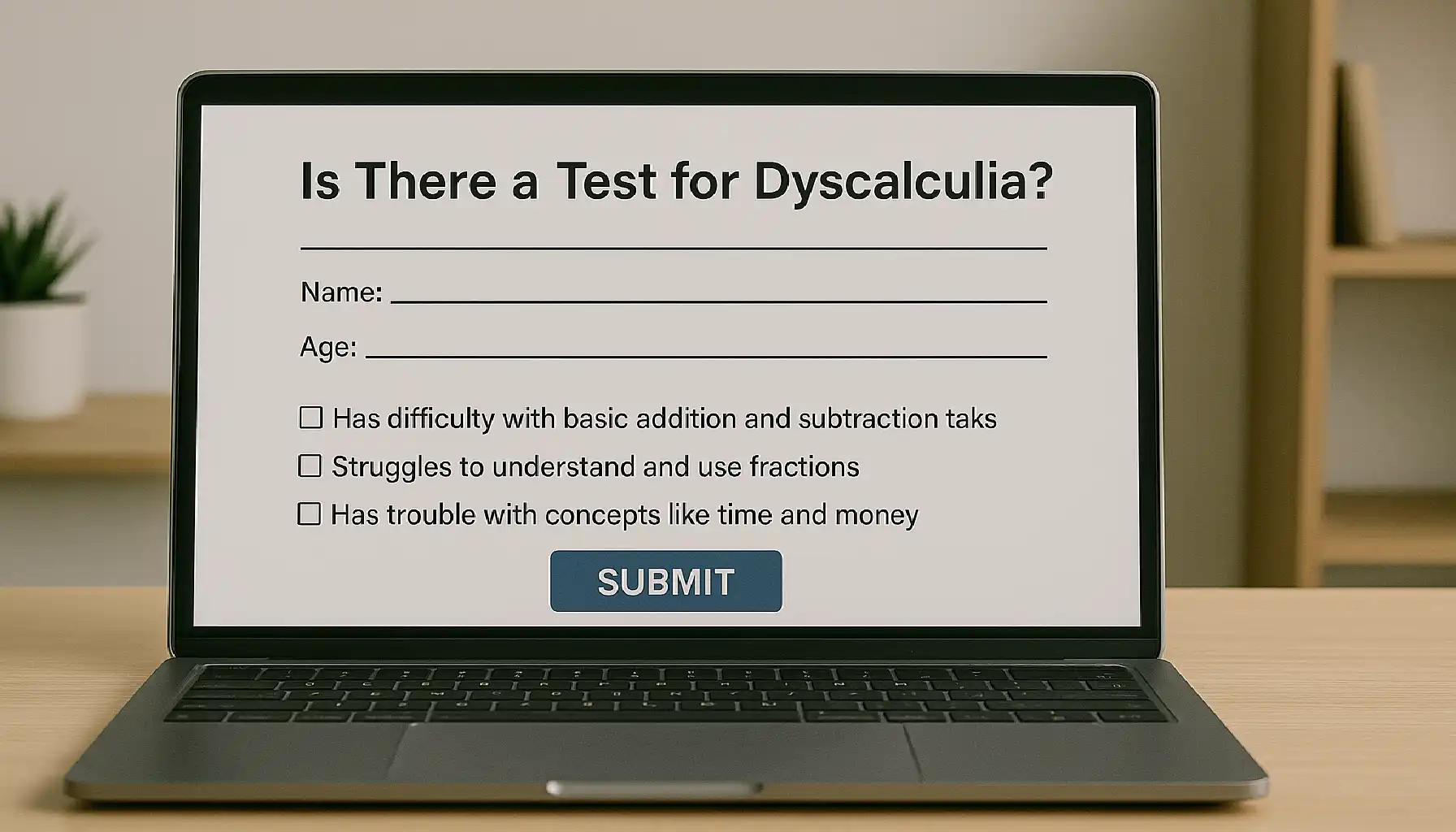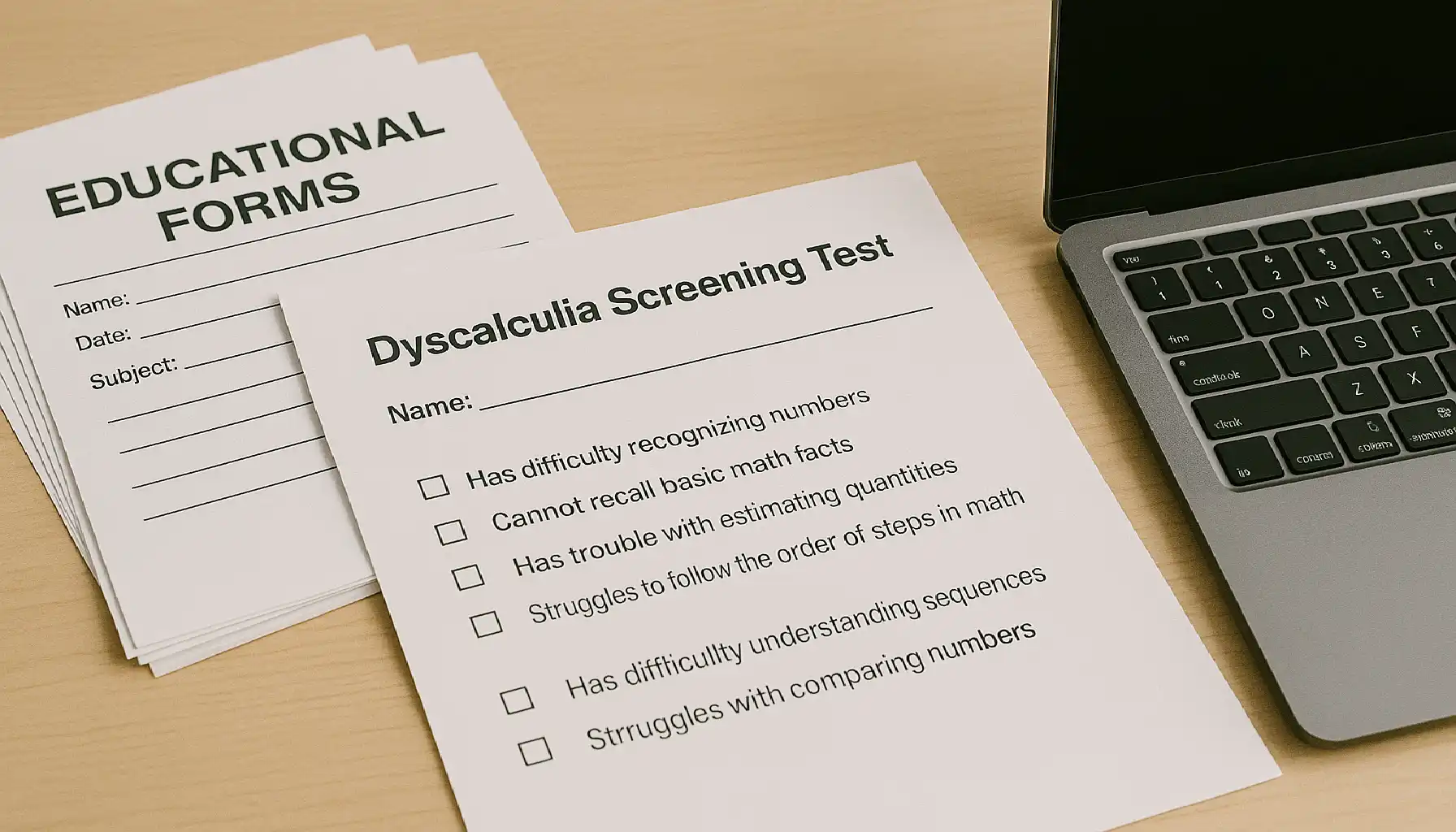Free Online Dyscalculia Test for Adults & Children

Contents:
Before you start searching for a dyscalculia test, you need to first understand your own cognitive patterns. If you struggle with numbers, time, or basic math operations, or if your child avoids anything involving counting or measurements, you might be looking for answers.
Start with something light but insightful, the Mind Elevate app. Available on Android, this app includes more than 35 memory games that can also help you train your logic, attention, memory, and yes, even math. How does this app help? You can create a cognitive plan based on how you perform in each skill area. This way, you can notice strengths and weaknesses early on.
It’s an ideal warm-up before taking a dyscalculia online test. Mind Elevate helps users, both adults and children, build awareness. Math games, visual puzzles, memory trainers, all in one tool. But let’s get back to the topic, and first, we want to know the definition of such a thing, because dyscalculia is often confused with dyslexia.

What Is Dyscalculia?
Dyscalculia is a learning disability that means you can’t correctly process numbers and math concepts. It’s like dyslexia, but for math. Dyscalculia is not an intelligence flaw. Your brain just can’t interpret numerical data, quantity, patterns, and spatial awareness.
This condition can appear in both adults and children, and it’s more common than you may think and often stays undiagnosed. Many people refer to it as “math dyslexia,” but the medical term is developmental dyscalculia. And it doesn’t mean you’ll never be able to do math, it just means you need different support.
If you're thinking of taking a dyscalculia symptoms test, here are some flags that usually come up:
Confusion with basic math facts like addition and subtraction
Trouble telling time on an analog clock
Inability to estimate distances, time, or quantity
Reliance on fingers or tools to do simple calculations
Anxiety during math-related tasks
Difficulty understanding charts, graphs, or number sequences
The good news is that most dyscalculia tests will ask you about these specific issues. That’s why many people find clarity after completing a structured screening.
If you’ve ever wondered how to test for dyscalculia, there are two main paths:
Online self-assessments (informal, but helpful)
Formal evaluations by psychologists or learning specialists
A dyscalculia test online is great: if you're unsure whether your math difficulties are a real concern or just a gap in learning. They often include scenario-based questions like:
“Do you mix up numbers when copying them?”
“Do you feel panicked when asked to calculate something quickly?”
“Do you avoid math tasks or feel embarrassed doing them?”
For younger people, you’ll want a free dyscalculia test for child or a test for teens that includes age-appropriate challenges. Some websites even have a downloadable dyscalculia screening test PDF that teachers or parents can use for offline reference.

Why and How Did it Happen?
These learning differences are usually run in families. If a parent has dyslexia or dyscalculia, their child is more likely to have it too. Scientists have identified several genes linked to brain development and migration that may play a role. Most of the research so far has centered around dyslexia, but many of the same genetic pathways are suspected to play a role in dyscalculia too.
One of the most studied genes in this context is DYX1C1, which is important for neuronal migration. It’s the process by which brain cells move to their correct locations during development. When this process is disrupted, it can affect how the brain organizes itself for tasks like reading or working with numbers. Another gene, ROBO1, is responsible for how brain cells connect and communicate, especially between the left and right hemispheres. This communication is responsible for visual and auditory information, which affects reading and possibly numerical reasoning.
KIAA0319 and DCDC2 are two other genes that influence how brain cells form stable connections during development. Irregular activity in these genes might interfere with how the brain learns patterns, stores symbols, or processes sequences. These skills are really important for both reading and math. Another gene, FOXP2, which plays a role in speech and language development, has also been linked to broader language-related disorders, which often overlap with dyslexia and, occasionally, with dyscalculia.
Not every brain works the same way, and that’s actually a good thing. Dyslexia may cause problems with reading, some people with dyslexia are strong in spatial reasoning, visual thinking, or creativity. Similarly, people with dyscalculia may be highly verbal or artistic.
Such traits may be evolutionary advantages in different settings, because reading and arithmetic are recent skills in human history. But pattern recognition, storytelling, and spatial awareness have been with us for hundreds of thousands of years.

Dyscalculia Test for Adults
Many adults quietly carry the effects of undiagnosed dyscalculia. If you still struggle with:
Making change
Understanding interest rates or taxes
Reading maps or schedules
Comparing prices or quantities
Estimating time
…you might want to take a dyscalculia test for adults.
Online versions usually have a math dyscalculia test with multiple-choice or scale-based questions. You should remember, these tests are non-diagnostic, but they can give you some basic insights. If your results are consistent with dyscalculia, it’s worth speaking to a specialist.
Some national healthcare systems even have resources. For example, the dyscalculia test NHS (UK) is often used as a discussion starter in educational or health settings.

Dyscalculia Test for Children and Teenagers
A dyscalculia test for child includes number sense, quantity recognition, math facts, and spatial understanding. Since many children also struggle with focus or reading, some tests bundle evaluations, like the dyslexia, dysgraphia, dyscalculia, dyspraxia test, to identify overlapping learning disorders.
If you're looking for a dyscalculia test teenager, expect to see more advanced content. These assessments look like multi-step problem solving, algebraic reasoning, and math memory. Even students with good general intelligence might fail to retain math skills.
Some schools will ask: how do they test for dyscalculia in children? Usually through:
Classroom observations
Teacher reports
Math-specific assessments
Memory and spatial reasoning tests
Is There a Test for Dyscalculia That’s Reliable?
Yes and no. They can give you a good insight, but no online dyscalculia test can diagnose you officially. A reliable test for dyscalculia adults or children must come from a trained professional. That said, informal tests are incredibly useful for:
Starting a conversation with a doctor or school counselor
Building awareness of your or your child’s learning profile
Preparing for a formal assessment
Formal Diagnosis: What to Expect
If your dyscalculia test results suggest a learning disability, the next step is formal testing. A licensed psychologist or educational diagnostician will usually:
Interview you or your child
Examine academic records
Administer IQ and math ability tests
Evaluate working memory, attention, and visual-spatial reasoning
A professional diagnosis helps unlock access to accommodations at school or work.
Dyscalculia vs. Dyslexia: What’s the Difference?
Both are learning disorders, but they affect different systems:
Dyslexia | Dyscalculia |
Reading and spelling issues | Math and number processing issues |
Problems with phonological awareness | Problems with number sense and sequences |
May confuse letters | May confuse symbols and numbers |
Slow reading speed | Slow calculation and math reasoning |
Often affects writing too | May affect time, direction, and spatial tasks |
It’s not unusual for people to ask for a dyslexia, dysgraphia, dyscalculia, dyspraxia test, especially if a child seems to struggle across subjects. These disorders can coexist or overlap, so a broad screening might be needed.
Living With Dyscalculia: Tools That Help
No test will make dyscalculia disappear, but knowledge is power. If you understand your condition, you can find tools that make life easier.
Recommended Tools:
Mind Elevate app: for math games, memory work, and logic practice
Visual aids: number lines, charts, color-coded steps
Calculators & math apps: don’t be ashamed to use them
Spaced repetition: improves long-term recall of math facts
Accommodations: extra time on tests, oral exams, alternative assignments
There are ways to make math less stressful and more manageable.
If formal testing confirms a diagnosis, students may qualify for:
504 Plans (U.S.): general education accommodations
IEPs (Individualized Education Programs): special education services
Alternative assessments: oral tests, calculators, extra time
At work, adults can request:
Clear written instructions
Task breakdowns
Flexible timelines for number-heavy tasks
There may also be other nuances that vary from country to country, so we recommend you to check what kind of benefits you may be entitled to.
Also check: Are You Left-Brained or Right-Brained? Take the Test!

Final Thoughts: Take the First Step
You don’t need to be “good at math” to succeed, but if numbers feel impossible no matter how hard you try, it’s time to ask why.
A dyscalculia test online won’t give you all the answers, but it will get you moving in the right direction. If you have a child who can’t learn math or an adult who is still confused about numbers, you will need some extra support to make your own life easier.
What to Do Next:
Try a free dyscalculia test for teens if you’re worried about a young learner.
Take a dyscalculia test for adults if you recognize the same struggles in yourself.
Use a brain-training tool like Mind Elevate to track and improve cognitive skills.
Bring your results to a qualified professional for full evaluation.
Advocate for yourself or your child, accommodations exist for a reason.
Dyscalculia can be misunderstood, overlooked, or mislabeled. And it’s because this kind of disability is kind of new. Not like it didn’t exist before, but doctors started recognizing and diagnosing people only recently. And with awareness, testing, and support, it becomes something you work with. It’s OK to take a test or ask a psychiatrist for help, and you may improve your quality of life if you know your strengths and weaknesses.
Quick Dyscalculia Self-Test
Answer Yes or No to each question:
Do you often mix up numbers when writing or copying them?
Do you still count on your fingers for simple math, like 5 + 3?
Do you get confused when reading analog clocks or estimating time?
Is it hard for you to understand charts, graphs, or number-based info?
Do you avoid tasks that involve math, even basic ones like splitting a bill?
Do you struggle to remember math facts (like times tables) no matter how often you practice?
Do you panic or freeze when someone asks you a math-related question out loud?
Do you find it hard to estimate distance, size, or speed in everyday situations?
Did you often fall behind in math at school, even if you did fine in other subjects?
Do you confuse directions like left/right or struggle with spatial orientation?
What your answers may show:
0–3 Yes: Probably within typical range, but keep monitoring.
4–6 Yes: Some signs may suggest a math-related learning difficulty.
7+ Yes: Strong indicators of dyscalculia; consider a professional evaluation.





